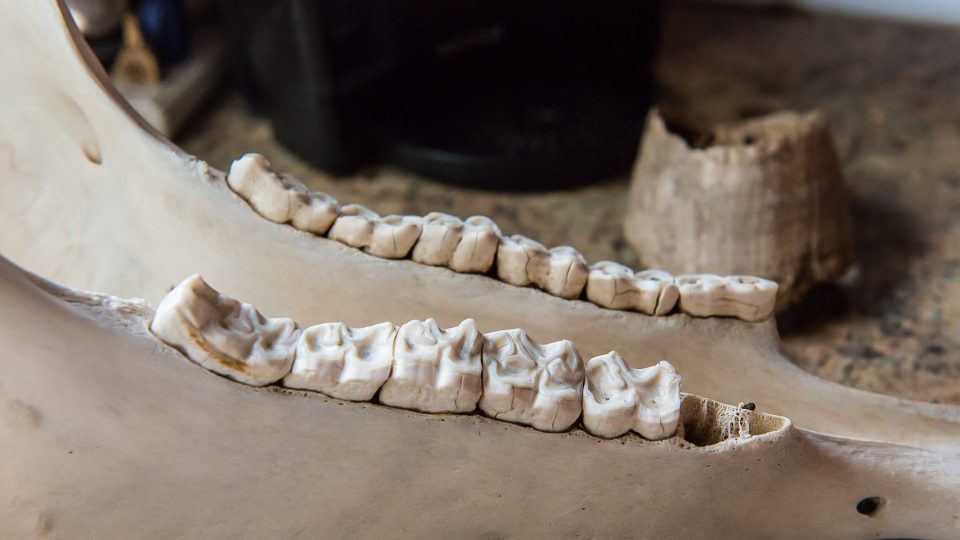
Horse Basic Care And Safety – Dental Care
Does you horse do any of the following?
- Spill food or hay when eating
- Tilt his head or yawns while eating
- Excessively drools when eating
- Refuses to eat EVEN THOUGH HE IS HUNGRY
Most of these things are directly related to pain within the mouth caused by something that is easily preventable.
This topic covers:
- Why horse teeth are so different than yours, your dog, your cat, a shark, or almost any other animal you know.
- Why preventive maintenance is avoided by most horse owners.
- Why maintaining teeth in horses is always better than fixing them.
- The theory and reasons why you need to maintain your horse’s teeth – and why most horse owners don’t.
**CONTINUED IN ARTICLE TAB**
Related material – Sometimes I have a lot of material here that I have written, podcasted, video blogs and other things. They will be listed in this tab.
Use the browser back button or menu to return to the index of topics.
10 Reasons Why Horse Owners Avoid Floating Their Horses
Horse’s teeth erupt throughout their lives with constant wear occurring from teeth grinding against opposing teeth and continual stropping by the tongue. This wear is uneven and creates razor sharp edges that cause discomfort as those edges ulcerate the cheek and their tongue. So if eruption and wear is continuous throughout the life of the horse and the result is pain within the mouth, AND the removal of the sharp points (floating) is easily done, WHY DO SO MANY HORSE OWNERS AVOID THIS IMPORTANT ASPECT OF HORSEMANSHIP?
1) THEY DON’T KNOW ANYTHING ABOUT IT
If you don’t know about the process of floating teeth and why it is done but you are reading this, then spend some time on my web site www.theequinepractice.com. Here is a compact yet detailed area where you can learn more. In fact, there are lots of places you can go to learn more. However, be aware that there are many sites and references where what is said may disagree with what I describe. My ideas are based on over 26 years of floating horses and over 42,000 floats. It is based on horsemanship and common sense.
2) THEY HATE THE DENTIST THEMSELVES
Horse and human teeth have very little in common. I realize that many of you fear the dentist more than death itself. But just one look at the relief your horse gets after having it’s teeth floated will quickly dissipate any anxiety. The primary purpose of floating horse teeth is to remove the sources of pain within the mouth. Realizing this will overcome any irrational thoughts you may have based on your personal experience.
3) THEY DIDN’T KNOW THERE WERE TEETH BACK THERE
What you don’t see must not exist. Well, that’s ridiculous. Ownership of an animal has the responsibility of knowing the basics. So here it is. There are 24 teeth in the back of the horse’s mouth behind where the bit lies. They are out of site but they can cause so much problems if they are not maintained. Why do they need maintenance? Because we have bred them for beauty, speed, agility, and strength but we have NOT bred them for their teeth.
4) THEY WAIT TILL THERE IS A PROBLEM
This is a button for me and all veterinarians you don’t want to push. Why wait till a problem arises when some prevention could prevent undue stress and pain in your horse? This is when someone offers the example of changing the oil in the car. I don’t because when you don’t change the oil and the engine fails, then you replace the engine. A horse is a living being and simply put, they have evolved into a near perfect creature. We as humans alter their base state by stabling, bitting, and riding and, most importantly, through breeding. So we have created an altered living being with an altered purpose. Therefore we MUST apply prevention because the end result cannot be replaced with a simple part replacement.
5) THEY HAD IT DONE ONCE AND SAW NO CHANGE
How many times will you dip your hand into your wallet and pay for something that you see no results in? Not often I’m sure. Not all tooth floating is the same. Some tooth floaters miss spots that continue to cause pain. Every float must address every point in the mouth to be effective. Pain is the most common cause of an incomplete floating. In our practice, pain is avoided by the place and pull technique as well as the use of pain relieving medication in the few horses that are extremely sensitive.
6) THEY HAD IT DONE ONCE AND VOWED NEVER TO HAVE IT DONE AGAIN
This I hear often. The past experience of the horrific approach of over drugging, head hanging, mouth jacking, and the application of power tools that grind the surface of the teeth like a carpenter would approach a block of wood. I have heard reports of horses unable to eat for long periods of time after floating, horses falling down from over drugging, jaws breaking from improper use of the mouth jack, neck injuries from head suspension along with the horse falling down, and even death from application of unproven theories such as incisor reduction. We are grateful for those who have experienced atrocities and yet seek us out knowing how important it is to have the teeth floated.
7) THEY CAN’T FIND AN EQUINE DENTIST IN THEIR AREA OR THEY HATE THEIR EQUINE DENTIST
Many rural areas have difficulties in finding competent horse care professionals. You may be reading this and live in a sparse area where the nearest vet, let alone equine dentist, live over 100 miles away. Worse yet, the dentist or vet that serves your area is incompetent or unreliable. Unfortunately, most quality professionals live in an area where they can make a better living. There are many reasons for this, but it boils down to money, or lack of it in your area. We are aware of this and therefore we drive throughout the US rather than fly. Many horse farms have gotten together to group their horses and wait until we come through the area. This way, an experienced equine dentist who has worked on some of the top equine athletes also work on your “backyard” horse. Someday I will teach many people to become competent in this skill so they can return to their areas and serve.
8) THEY HAVE NO FAITH IN THEIR VET
This is a little tougher. If you don’t like your vet doing your horse’s teeth, and he or she is the only vet coming to your area, you don’t want to loose the relationship and loose the emergency response for colic or suturing. Some vets are jealous of other practitioners and will make it hard for others to work in “their territory.” Life is not fair. It is more important that you get the teeth floated even if it goes against your horsemanship. You may need him later for an emergency and this is always important.
9) THEY DON’T CARE ABOUT THEIR HORSE
This possibility seems beyond most horse owner’s imagination. Yet I hear this often: “Doc, this one’s for sale so we aren’t floating this one to save the expense.” How much more money could have been received if the horse went without his head fighting the bit? In our opinion, ownership of any animal, no matter how brief, demands we give the highest level of care. However, as a vet, I have seen repeatedly abuses from not floating all the way to death by starvation. It is human nature.
10) THEY ARE BROKE OR THEIR EXPENSE PRIORITIES ARE WRONG
This one is more apparent with the economy today. When horses are being abandoned or starved, how would teeth floating even be considered? Well, I am not talking about the extreme cases. It is the person whose expense priorities are not in order. When someone forsakes floating their horse’s teeth for squandering their money on something whose value has no baring on a living being, a question must be asked. Who is your horse’s advocate? It is you. Not me or the vet or the neighbor.
The normal chew pattern of horses.
Do horses need their incisors to harvest grass? This slow motion video helps to answer this not-so-obvious question.
Videos (these open in a new tab so you can get back here easily)
- Frequently Asked Questions about horse dentistry
- View 8 short videos showing the horsemanship approach to dentistry
- Videos of floating horses using horsemanship
Podcasts
- The TMJ Of Horses – The Horse’s Advocate Podcast #034 (November 11, 2021)
- 75,000 Horses Floated By Hand – The Horse’s Advocate Podcast #029 (September 9, 2021)
- The Threshold Of Pain In Horses– The Horse’s Advocate Podcast #015 (June 23, 2021)
- Frequency Of Floating Horse Teeth– The Horse’s Advocate Podcast #004 (March 3, 2021)
- Medications in Equine Dentistry – The Horse’s Advocate Podcast #001 (February 13, 2020)
Blogs (these open in a new tab so you can get back here easily)
- Speechless In A Case Of EOTRH In A Horse (Apr 18, 2020)
- The Trouble With Dentistry As Seen By A Human Doctor (Jun 18, 2019)
- How We Perform Equine Dentistry Matters (Dec 16, 2018)
- What Is The Cause Of EOTRH In Horses? (Dec 6, 2017)
- Horsemen, Surgeons And Equine Dentistry (Nov 20, 2017)
- This Client Just Says “Easy” to Equine Dentistry Without Drama™ (Jul 23, 2017)
- Top 10 Things To Know Inside Your Horse’s Mouth – a Horsetalk webcast (Jun 5, 2016)
- Integrity (Jun 11, 2014)
- Pull The Tooth! (Apr 13, 2014)
- Kicked In The Teeth (Apr 6, 2014)
Videos (these open in a new tab so you can get back here easily)
- Frequently Asked Questions about horse dentistry
- View 8 short videos showing the horsemanship approach to dentistry
- Videos of floating horses using horsemanship
Podcasts
- The TMJ Of Horses – The Horse’s Advocate Podcast #034 (November 11, 2021)
- 75,000 Horses Floated By Hand – The Horse’s Advocate Podcast #029 (September 9, 2021)
- The Threshold Of Pain In Horses– The Horse’s Advocate Podcast #015 (June 23, 2021)
- Frequency Of Floating Horse Teeth– The Horse’s Advocate Podcast #004 (March 3, 2021)
- Medications in Equine Dentistry – The Horse’s Advocate Podcast #001 (February 13, 2020)


Responses